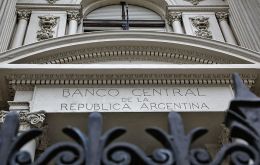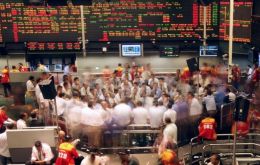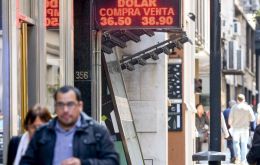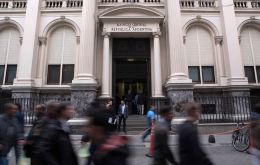MercoPress. South Atlantic News Agency
Tag: leliq
-
Friday, January 11th 2019 - 08:43 UTC
Argentine forex market volatility: Central bank intervenes to prop the dollar, first time in seven months

Argentina’s Peso closed stronger on Thursday, but remained outside the limits of a trading band set by the central bank after it intervened in the market by buying US$ 20 million.
-
Wednesday, January 9th 2019 - 14:49 UTC
Brazil's Bovespa closes above 92.000 points for the first time ever

Latin American stocks in the region's main markets closed on Tuesday at new highs on the positive outlook for the ongoing US/China trade talks in Beijing. Brazil's Bovespa index ended trading above 92,000 points for the first time ever after hitting several record highs last week.
-
Wednesday, October 24th 2018 - 08:40 UTC
Argentine Peso slips on Tuesday; central bank sells debt notes at a rate of 71.39%

Argentina’s peso slipped on Tuesday, a day after the central bank’s new governor reassured the public that its approach to taming the country’s rocky economy would be sustainable over the medium term. The peso closed 0.46% weaker at 36.65 per U.S. dollar. The currency has fallen 0.30% against the dollar this week, although it has climbed 12.63% since the beginning of the month.
-
Friday, October 5th 2018 - 08:36 UTC
Argentine Peso slips on Thursday on prospects of higher US interest rates

Argentina’s Peso fell on Thursday, pressured by the recession-hit country’s dismal inflation outlook and higher U.S. interest rates that have pushed capital away from riskier emerging markets and toward the greenback, local traders said. The peso shed 1.85% to close at 38.4 per dollar after having gained 9.58% over the previous three days under a freshly-renegotiated International Monetary Fund financing deal that calls for tougher fiscal and monetary policy measures.
-
Tuesday, October 2nd 2018 - 08:21 UTC
Argentine Peso rises 4% after central bank sells seven-day notes paying 72%

The he Argentine peso climbed more than 4% on Monday trading on the back of a debt sale by the central bank aimed at mopping up excess liquidity and signs that the International Monetary Fund (IMF) is solidly behind the administration of president Mauricio Macri.
